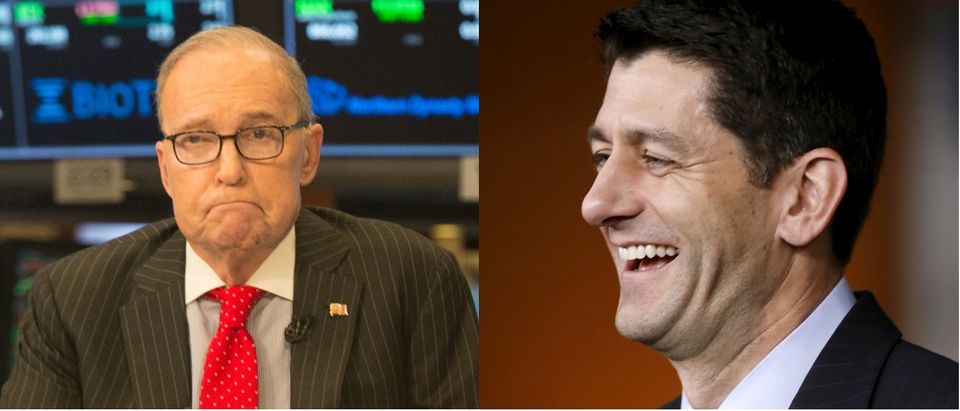House Speaker Paul Ryan has declared ‘Mission Accomplished’ with the tax cut law (as for the bloated spending bill recently passed – nothing to see here people, move on). His 20-year House career is over. Perhaps Eric Cantor is scouting out Wall Street corner-office jobs for his pal. Meanwhile, at the White House, Larry Kudlow, the president’s new chief economic adviser, is saying strange, new, sensible things about trade with China.
Ryan, who ascribed to Ayn Rand’s theory that society was made up of ‘makers’ and ‘takers’ (the ‘takers’ being leeches off of the creative, successful, intelligent ‘makers’), spent most of his leadership career as chairman of the House Budget Committee.
While there, he created fantasy budgets, cutting spending for everybody but dairy farmers (his House district is in Wisconsin) and the military. In Ryan’s fantasy world, Medicare would be privatized, with seniors receiving vouchers — also known as “premium supports” — to subsidize their health insurance payments.
The bad elf in this fantasy was the planned decrease in the amount of “premium supports” seniors would receive. Why? Because seniors who aren’t working are ‘takers’ and their burden on the ‘makers’ must be decreased. Ditto for the people receiving Social Security disability benefits, as they are eligible for Medicare also.
Despite the bad elves in Ryan’s budget proposals, the majority of House members always voted for them. It seems they realized these budgets would never mature into reality, and posed no danger to them during election season.
With Paul Ryan on the way out, perhaps this is the end of viewing Americans as ‘makers’ and ‘takers’. After all, when the spending bill came up last month, Ryan threw his Ayn Rand philosophy under the bus.
At the other end of Pennsylvania Avenue is Larry Kudlow, widely known for his dedication to free-market principles. He’s not an economist (his bachelor’s degree from the University of Rochester was in History), but he was influenced greatly by Milton Friedman, as this article demonstrates.
Although Friedman is known more widely for his philosophy on inflation and central banks, he also was an ardent free-trader. So much so, that he tolerated ‘mercantilist’ countries (those which deliberately undercut the price of their exports in order to dominate an importer’s market).
He believed people in importing countries benefitted from the lower prices offered by mercantilist exporters. Further, he believed mercantilist countries could not afford to depress prices forever, and eventually would sell goods at market prices.
But what about the people in the importing countries whose jobs were wiped out by the mercantilist country’s exports? How long was ‘eventually’? Friedman had no answers.
Or what if the country was large, state-controlled — and reasonably efficient? In other words, its government was good at picking winners and losers. And its consumers were docile — if all of the country’s apples were being exported and none available for domestic consumption, no backlash would result.
Friedman, in my opinion, would be humming the old Frank Sinatra song: “It Never Entered My Mind”.
Fortunately, Larry Kudlow has realized the downside to Friedman’s dictums.
As a civil servant in the 1990s, I sat on many boards involved in trade retaliations. When it came to intellectual property rights, China always hit the top of the charts.
It was maddening. When a lobbyist representing a consumer goods firm spoke to me about not retaliating against China, I asked him if he knew whether the Chinese factory supplying goods to the firm was using stolen software. His reply was a blank look.
Although our committee had stacks of findings, the State Department always advised the White House not to retaliate against China. Their usual excuse: there’s a summit/conference/meeting coming up in the next few months. Retaliation would spoil the mood of the event. Quelle horreur!
Of course, there’s always a summit/conference/meeting on the horizon.
Ergo, the inevitable result was a fake stern warning from us, with the Chinese laughing up their sleeve. This continued for decades.
At last, under President Trump, there are no more fake stern warnings. And Larry Kudlow understands and accepts the reasons why.
Just as Paul Ryan’s exit may signal the end of the destructive Randian ‘makers and takers’ philosophy, Larry Kudlow’s newfound support for trade action against China also may signal the end of slavish adherence to Milton Friedman’s trade philosophy.
In both instances, America will be better off for it.
Joanne Butler is a graduate of the Kennedy School at Harvard, was a professional staff member (Republican) at the House Ways and Means Committee, and served in President George W. Bush’s administration. The Ghanaian poet, Kwesi Brew, has described her as ‘vibrant.’
The views and opinions expressed in this commentary are those of the author and do not reflect the official position of The Daily Caller.


